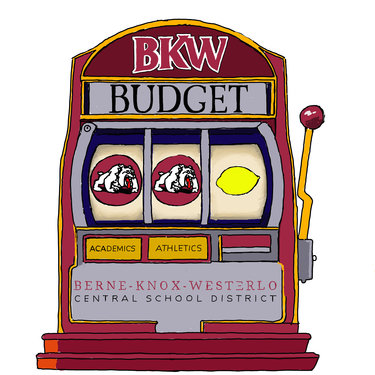Berne-Knox-Westerlo School Board is taking a ‘helluva gamble’
Unlike village or town budgets or the state budget, New Yorkers vote on school budgets. School taxes are significantly higher than municipal taxes and voters have a say.
We’ve written many, many times on this page on the value of supporting school budgets. For parents, the reason is obvious. But for the many taxpayers without children in our public schools the benefits are as practical as maintaining real-estate values and as philosophical as maintaining democracy.
The future of our society, our progress in the arts and sciences, depend on good public education. In this century, schools have taken on many duties once supplied by homes or by community institutions.
Schools provide mental-health care experts as well as social workers for students who require those services. Schools supply meals to students who otherwise wouldn’t eat. Schools provide a sense of community where it is lacking.
We are always saddened when a school budget is defeated. Each year for the three school districts we cover — Berne-Knox-Westerlo, Guilderland, and Voorheesville – we cover the budget-building process as it unfolds to give citizens a chance to voice their views and to make their needs and concerns known.
Over the last four decades, we have covered a number of budget defeats. They became much less frequent when the state over a decade ago adopted what is commonly called a tax cap.
A formula applied to each school district sets a levy limit. If a district goes over that limit, rather than passing with a simple majority vote, more than 60 percent of voters, a supermajority, have to approve the spending plan.
This formed a contract with voters that became symbolic. Since the tax cap was adopted, almost all the districts that stayed under the cap passed their budgets.
None of the districts we cover had ever pierced the cap until this year. Berne-Knox Westerlo was one of 32 districts of the 674 districts statewide to go over the levy limit.
While nearly 99 percent of the school budgets under the cap this year passed, only 69 percent of those above the cap passed.
BKW’s budget failed by 8 votes with 345 voting in favor and 243 voting against. Fewer than 600 residents voted in a district with more than 6,000 residents.
This left the district with three choices, as set out by state law: to put up the same budget for a revote, to put up a revised budget, or to move directly to a contingency plan.
If a second budget, on June 18, is defeated, the contingency budget is automatic, meaning the tax levy must remain the same as this year.
We anticipated a session on Wednesday, May 29, would be similar to those we had covered years ago when BKW suffered budget defeats or those we covered in Guilderland, in two separate periods, when active citizen groups rallied for budget cuts, leading to defeat.
At BKW, there never has been an orchestrated campaign to defeat a budget. Rather, there were residents who simply felt they couldn’t afford the high taxes.
We anticipated the May 29 meeting would have the school board working through lists of cuts that would be the least harmful to students while still palatable to voters.
We thought it would be rather simple to answer voter concerns because one single expenditure — paying for a school resource officer — had added the roughly $80,000 that pierced the cap. Just removing that single expense would have made a revised budget that would need just 50 percent of voters to pass.
Such a plan, which would have been far easier to pass, would have guaranteed all of the things from sports and clubs to small class sizes, that students have come to count on.
But, rather than the somber tone of those long-ago post-defeat meetings, the school board session on May 29 felt more like a pep rally.
The audience of parents, students, and school supporters largely commended the board members and applauded their decisions.
There was no reckoning.
Rather, there was outright denial there had been a budget defeat.
“The budget passed,” said long-time board member Matthew Tedeschi. “It just didn’t hit 60 percent.”
The board’s president, Kimberly Lovell agreed: “Our community technically voted for the budget,” she said.
Tedeschi also said of school leadership, “We’re a great group …. Look at this room; they’re all here saying ‘yes.’”
So the board’s strategy is to get more people to vote. “If more ‘no’s come out, it’s only for a year,” Tedeschi said.
He also predicted, “This will pass by 150 votes … What we’re doing is winning.”
He may well be right since the school is the largest employer in Berne and school staff and parents tend to vote while many other residents don’t. Frequently school budget elections draw just a tenth of district voters; and revotes often draw even less.
But what about the people not in the room on May 29?
The $26 million spending plan that the board adopted for the second time, requiring a supermajority vote, has a tax-levy increase of 5.09 percent, which is hefty enough to strain some households.
Nearly a quarter of BKW’s students are eligible for free or reduced-price lunches, a figure based on household income.
“Many of our residents are struggling to put food on the table and gas in the car,” said Helen Lounsbury, a retired BKW teacher and board member, at the earlier budget hearing, which she reiterated in a letter to the editor. “This proposal could well be the straw that breaks the camel’s back!”
The pep rally atmosphere on May 29, which didn’t allow for an understanding of those who had voted against the budget, featured an enemy as pep rallies do: the governor.
“It’s important for the community to understand what this governor is trying to do to education,” said Tedeschi of Kathy Hochul.
Hochul, for the first time, restored full Foundation Aid to schools. In this year’s budget, though, she proposed two changes.
One was to do away with the hold-harmless clause that has protected schools like BKW by maintaining the same aid although enrollment has declined.
With 655 current students — grades range in size from 40 third-graders to 61 tenth-graders — BKW now has about half as many students as it did a quarter-century ago.
Hold-harmless was preserved in the current state budget while a commission studies aid to make recommendations ahead of the next year’s budget negotiations. So BKW was unharmed, for now.
For the last decade, the district has benefited from state aid no longer being flat as well as from federal aid related to the pandemic, which the superintendent said on May 29 has paid for perks as far-ranging as e-sports and a new sound system for the school auditorium.
The other change the governor proposed was the way in which inflation is calculated. A compromise was reached with the legislature so that the aid was more than the governor wanted but slightly less than the previous year for schools across the state.
The tenor of the May 29 meeting, though, was that BKW was unfairly targeted.
“The unfortunate truth is that the lack of state aid is what is directly impacting our tax levy, not the misuse of district funds,” said Lovell. “We are strong in our belief that our students, regardless of our rural location, deserve an equitable education.”
The proposed $26 million budget counts on about $12 million in state aid with about $12 million coming from property taxes and the rest coming largely from reserves and the district’s fund balance. The proportion of BKW’s budget funded by state aid — at roughly $18,000 per student — is much greater than for the Voorheesville or Guilderland districts.
All of our districts have had to do without services many consider essential.
Just one example, from Guilderland, is for a floating nurse. In the final days of hammering out the budget, the Guilderland School Board heard from teachers, parents, and the nurses themselves about the value of having a nurse who knows the students able to care for them.
One example involved an elementary student with diabetes who had to leave school on a day when an agency nurse couldn’t handle his condition.
That fill-in nursing position had been added with federal pandemic funds and could no longer be afforded. We believe every school board member wanted to add that nurse to the budget but the roughly $80,000 it would cost — about the same that BKW’s school resource officer would cost — wasn’t tenable.
All but one Guilderland School Board member thought the budget needed to stay under the cap. It did, and passed with 72 percent of the vote.
One parent in the supportive BKW crowd on May 29 asked the board, “How much of a gamble are we taking?” She noted her children were older and their college careers would be built on their high school success.
“That’s a helluva gamble,” she said.
It is, indeed. We hope the budget passes. More importantly, we hope the board in its hubris hasn’t risked the good will of the community it serves.
In the four decades that we’ve covered BKW, we’ve always been impressed with its sense of community, which is more cohesive than in any of the other districts we cover.
Twelve years ago, in an era when aid was less prevalent and budget passage less secure, we editorialized on BKW being one of just three districts across the state honored in the “Be the Change for Kids Innovation Awards Program,” sponsored by the College of Nanoscale Science and Engineering, run through the New York State School Boards Association.
The district was lauded for its Community Connections program, initiated by BKW’s second-grade teachers in 2005. Its strength was that it drew on the community’s wealth — that is, the residents who cared enough to share their rich expertise, from the long-time Berne town clerk who taught the children about voting, demonstrating on real machines at Town Hall, to a young mother and writer showed the kids how she makes maple syrup and reads them a book about it.
The annual budget for the award-winning program (partially funded by the Parent Teacher Association) never exceeded $1,000.
Helen Lounsbury, who wrote the 74-page application that won the award, stated in it: “To the casual onlooker, our district is a place that time forgot,” said Lounsbury, citing the lack of public transportation, limited access, and almost no commercial tax base.
“Though sparsely populated,” she goes on, “there is a strong sense of community for which the school provides common ground.”
No matter what happens with the June 18 vote, we urge the board and the newly named BKW superintendent and secondary-school principal to go beyond the meeting room full of supporters, to listen to people in the community at large, and to seek common ground.



